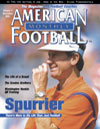Article CategoriesAFM Magazine
|
Spurrier Q&A© More from this issueFlorida head coach Steve Spurrier is a hands-on boss who coaches his own quarterback, coordinates his own offense and calls his own plays, and does it as well, if not better, than anyone in football. In many ways, his coaching style is an extension of his playing career, when he played quarterback for the University of Florida and three NFL teams during a 10-year pro career. During the week before a recent open date, Spurrier took the time to talk with American Football Monthly's Richard Scott and discuss his coaching philosophies and some of the valuable lessons he has learned during his coaching career. Spurrier doesn't follow a lot of the old coaching axioms, but his success offers proof that sometimes coaches need to think outside the box and forge their own path. AFM: Florida has tremendous fan support and a strong recrui....The full article can only be seen by subscribers. |
|
|||||||
| HOME |
MAGAZINE |
SUBSCRIBE | ONLINE COLUMNISTS | COACHING VIDEOS |
Copyright 2025, AmericanFootballMonthly.com
All Rights Reserved





